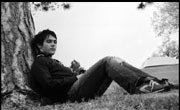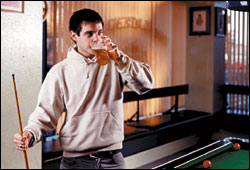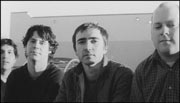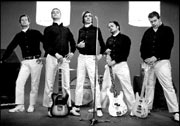BRIGHT EYES
M. WARD, THE BRUCES
Showbox, 206-628-3151, $15/$13 adv.
all ages, 7 p.m. Fri., Oct. 18
CONNOR OBERST IS worn down and disillusioned, old-soul weary in the way only a 22-year-old can be. On the new Bright Eyes record, Lifted, or the Story Is in the Soil, Keep Your Ear to the Ground, he sings with strangled indignation, “I have sat too long in my silence, I have grown too old in my pain/To shed this skin, be born again, it starts with an ending.”
Ah, youth.
Then again, Oberst has lived a rock life longer and fuller than most musicians twice his age: 11 albums and EPs, three bands, one self-started record label. His distinctly quavering voice is familiar not only from the rubbed-raw nerve that is Bright Eyes but also through former outfit Commander Venus—a band started when he was only 14—and harder-rocking side project Desaparecidos. Still, Oberst will likely always be identified with Bright Eyes, the solo act in which, in the grand lachrymose tradition of Nick Drake, Elliot Smith, and Isaac Brock, he’s a man behind glass, always alone, but always reaching out.
It’s a tricky line to toe, one easily tipped toward melodrama and plundered by pale imitators. Fortunately, Oberst’s aware of the potential pitfalls. “I’m certainly embarrassed about a lot of the songs I’ve written,” he admits, “but I think embarrassment is good—it keeps you humble. And I’d rather be creating all the time than waiting around for the perfect song. I’ve never been anywhere near a perfectionist, so I think it’s just better to do what you can.”
Bright Eyes’ latest is certainly no tidy package, but it won’t lose Oberst his emo-king crown either—heavy as it may hang. “I’ll be the poster boy for whatever, I don’t mind. But emo—I don’t know,” he says, with what sounds like a shrug. “I guess I never really knew what that was all about anyway. I think of it as bands that sound like Sunny Day Real Estate, and I never thought we sounded like them that much.”
Lifted (more on the album’s full, elaborate title later) certainly lacks the traditional song structures of SDRE and numerous other Sunny-come-latelies. The album Spin recently called a “nonstop neurotic cabaret” retains Oberst’s tortured lyrics but sets them over a bed of multitracked low-key chaos, lurching and bobbing from jagged country waltzes and barely there acoustic sketches to gorgeous AM-radio pop.
Opener “The Big Picture” strains the limits of song craft, sprawling over eight fretful, angst-ridden minutes, while the back-to-back tracks “You Will. You? Will. You? Will. You? Will” and “Lover I Don’t Have to Love” are tight, heartrending contrasts in love vs. lust. “Bowl of Oranges” comes as close to a bouncy ditty as anything Oberst’s ever attempted, but the record soon comes full-circle, closing out with the 10-minute wet-eyed tirade “Let’s Not Shit Ourselves (to Love and to Be Loved).”
As you may have guessed by now, romance and pain are two ever-popular—and ever-linked—topics in the Bright Eyes canon. Take the aforementioned “Lover . . . ,” a menacing tale of hedonistic tour sex and drugging, on which Oberst wails, “Love is an excuse to get hurt and to hurt/Do you like to hurt?/I do, I do/Then hurt me, hurt me”—compelling enough evidence for his inclusion in the masochists hall of fame.
Curiously, Lifted‘s most direct influence may not be immediately recognizable, given Oberst’s fragile tenor. “There’s this Leonard Cohen album, Death of a Ladies Man,” he says of the gravel-chested singer’s lush 1977 Phil Spector-produced effort. “It was very Cohen-style twisted kind of folk songs, with this huge sort of Motown instrumentation, and I like those two things happening simultaneously.”
But what of L, OTSIITSKYETTG, Oberst’s latest album title—the one long enough to give Billboard copy fitters seizures? “Originally, it was sort of like [1964 film classic] Dr. Strangelove or How I Stopped Worrying and Learned to Love the Bomb,” says Oberst. “Lifted was the [original] title, and that was mostly because it was a word that came up in a lot of the songs just by happenstance, and I realized that I liked all the different connotations of that word—obviously transcending something or rising above something, and then feeling and getting fucked up.”
Oberst may be summing up more than just the subtitle when he concludes, “More or less, it’s the idea of trying to understand the universe as this big run-on sentence that doesn’t end—about this nothing that you can make beautiful if you want it to be.”









